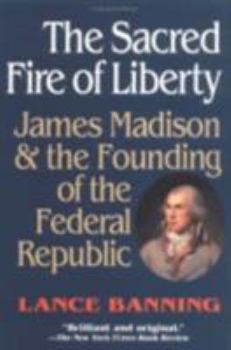The Sacred Fire of Liberty
Select Format
Select Condition 
Book Overview
Banning (history, U. of Kentucky) argues that Madison was not an intellectual pragmatist who reacted variably to the changing circumstances of the Revolution and the Confederation. Rather, Madison... This description may be from another edition of this product.
Format:Paperback
Language:English
ISBN:080148524X
ISBN13:9780801485244
Release Date:March 1998
Publisher:Cornell University Press
Length:560 Pages
Weight:1.80 lbs.
Dimensions:1.3" x 6.1" x 9.1"
Age Range:18 years and up
Grade Range:Postsecondary and higher
Customer Reviews
2 ratings
Lance Banning and the hermeneutics of generosity
Published by Thriftbooks.com User , 17 years ago
Lance Banning passed away on Jan. 31 of this year. When I learned this I decided to change the focus of my review a little. First, what do I mean by the hermeneutics of generosity? By hermeneutics I mean a scheme or method of interpretation. An intellectual biographer who uses a hermeneutics of generosity starts off with certain assumptions. Everything people do they do for reasons. From the point of view of the biographical subject they are always good reasons. If you believe your subject to be a person of exacting moral standards and exceptional intelligence, then you assume that everything they have done can be back up by compelling arguments that have been long considered. This style of hermeneutics is obvious in two ways in Banning's work. Obviously, in the way he approaches Madison. But the first thing I want to talk about is the way Banning reacts to other scholars. His notes are extraordinary. Banning read everyone who had written on Madison and located his interpretations in relation to that of others. He not only carefully explains the differences between his interpretations and those of others (e.g., Martin Diamond, Gordon Woods, Paul Rahe and Jennifer Nedelsky among others) but he also points out the strengths of their alternatives. This was a man who knew how to listen to his sources and not just to one up them. But it is really in regard to James Madison that Banning's approach shines through in all its humanity. Banning believes that there is a standard version of Madion's intellectual biography that is largely wrong. That standard version is based on the biographies of Irving Brant and Ralph Ketcham and the intellectual histories of Gordon Woods and Martin Diamond. In the standard version, James Madison (JM) started off as a strong nationalist in the early 1780s. He was part of the movement at that time to modify the Articles or to change them completely. JM's method of constitutional interpretation at that time is usually considered to have been expansive or willing to loosely construe the document so as to justify non-explicit central government powers (e.g., Morris' national bank). JM's nationalistic period continued all the way through his work at the Constitutional Convention, the writing of The Federalist and his first year in the new Congress. However, when Hamilton's economic programs began to unfold during the second and third terms of Congress, JM began to backpedal on his nationalism and his expansive constructionism. By the mid-1790s, JM is usually seen as a strict constructionist and a states rights theorist who would remain so all his life. Thus the standard version gives us two Madisons, who can only be connected by various versions of the Madison as practical or conniving politician who changed his stripes due to the political winds of the moment. Banning will have none of this. He believes the standard version misrepresents all aspects of JM's career. Banning believes that if we take JM's writings throughout h
Madison finally revealed
Published by Thriftbooks.com User , 23 years ago
Lance Bannings book is excellent, and long ovedue. History has left us a view of Madison that suggested he was Jefferson's lieutenant, an apostate to his nationilistic views in the 1790's, one view even diminished him to a 'trimmer' of ideas. The average person knows little of the Father of the Constituion, and as Jack Rakove stated at Princeton this February passed, we are learning what Madison always knew. Most views of Madison are not the result of individual study and research, many opinions of Madison arise from previous treatments. Banning began with the exchanges of Madison and found the consistency Madison always claimed. The actual history of Madison reveals an enormously capacious, hard working force behind the Constituion, Bill of Rights,The Federalist Papers, 41 years of public service, and the workings and definition of goverment. Viewed by friend and political foes as, brilliant and ' one adept at committee work and reasoned argument, one who could be depended on to speak and write with precision and force what others could express but vauely and in part.' Banning has surpassed those before him in Madisonian scholarship, by ardously discovering The Real Madison. The attention to detail is excellent, and the scholarship is not self defending just revealing. As Madison's true nature unfolds the consistency is revealed, from lieutenant to an independent thinker, and finally to the proper position of one the key thinkers behind American government. Being one dependent on scholars for my view of history, and granting then occaisonally the keepers of arcanum a merit they do not deserve, it is refreshing to have Lance Bannings contribution not only to Madisonian scholarship, but also to American History. The ongoing efforts by Dave Mattern and the Papers of James Madison have brought enormous information to light in the last few years, and it appears the work of Banning may be the beginning of Madison taking his deserved place in our history and common parlance, a parlance altered by the independent and ardous study this book represents.




